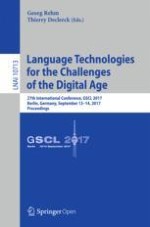1 Introduction
According to the standard view of quantity implicature calculation, a user, reading this statement, would reason as follows:S: The HP Laptop has a good AMD Radeon graphics coprocessor.
In this example, the statement that the agent had heard a lecture on graphics coprocessors suggests that S is at least competent with respect to these processors. Hence, the user will infer without doubt that the graphics coprocessor in question is not excellent, which might affect his purchase decision more strongly than the weak implicature that the system just doesn’t know whether the coprocessor is excellent or not.S: I’ve heard a lecture at ComputerCon about that generation of graphics coprocessors. The HP Laptop has a good AMD Radeon graphics coprocessor.
2 Related Work
3 Testing the Competence Assumption Locally and Globally
-
politeness forms
-
personally given indication of competence through additional information
-
professionally induced indication of competence through additional information.
3.1 Participants
3.2 Materials
Global competence trigger: | |
S: |
My name is Mr. Miller. My shift ends in 5 min, but I’m sure we’ll find something for you.
|
Local competence trigger: | |
S: |
I have to admit I don’t know a lot about that.
|
3.3 Discussion and Results
Analysis of variance table | |
Response: competence | |
Pr(>F) | |
Item | <2.2e−16 *** |
Group | 0.4973 |
Item:group | 3.856e−13 *** |
Signif. codes: 0 *** 0.001 *** | |
-
neutral-negative
-
positive-negative
-
positive-neutral.
-
neutral:local-neutral:global (p = 0.972)
-
positive:local-neutral:global (p = 0.50)
-
positive:local-neutral:local (p = 0.848).
